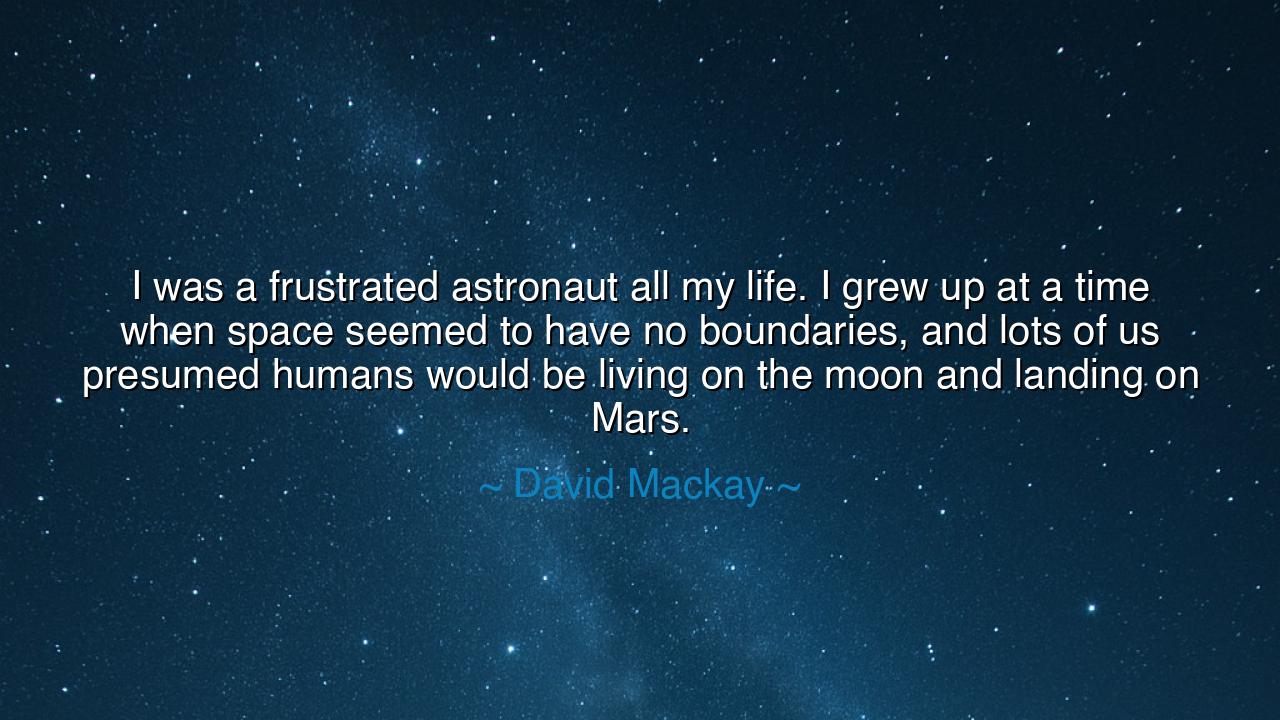
I was a frustrated astronaut all my life. I grew up at a time
I was a frustrated astronaut all my life. I grew up at a time when space seemed to have no boundaries, and lots of us presumed humans would be living on the moon and landing on Mars.






Children, gather close and listen with open hearts to the words of David Mackay, a man whose spirit was shaped by the endless possibilities of the stars. He once said, "I was a frustrated astronaut all my life. I grew up at a time when space seemed to have no boundaries, and lots of us presumed humans would be living on the moon and landing on Mars." These words, full of longing and vision, speak to the boundless dreams of a generation—one that looked to the sky and imagined that the heavens themselves were within reach. But what happens when the dream of exploration and discovery falters, when the path to the stars is not as clear as it once seemed?
In the time that Mackay speaks of, the world was filled with the hope of space exploration. It was an age of unprecedented discovery, when men had walked on the moon, and the idea of traveling to Mars seemed like a natural next step. The moon landings of Apollo 11 in 1969 filled the hearts of many with the belief that there were no limits to what humanity could achieve. The stars were no longer distant and untouchable; they were something that could be reached by human hands, and the future seemed to shine with the promise of even greater adventures beyond.
Yet, as the years passed, the dream of space travel slowed, and the space race gave way to more earthly concerns. David Mackay speaks of his frustration, for he, like many others, believed that humanity would soon be living on the moon, or walking upon the surface of Mars, yet the barriers of time, technology, and resources held those dreams in check. The limits that seemed so far away in the early days of space exploration became more apparent, and the path to the stars grew more distant than many had imagined. The dream of colonizing other worlds did not vanish, but it was delayed, leaving those who had once believed in it with a sense of longing.
Consider, children, the ancient explorers, who also dreamed of new worlds and unreachable frontiers. Christopher Columbus, driven by a vision of a world that lay beyond the horizon, embarked on a journey across the unknown seas. In his time, the world was believed to be flat, and yet he sailed toward what was thought to be an impossibility. His courage, like the courage of those who dreamed of walking on the moon, was grounded in a belief that the world had no boundaries—a belief that fueled not only his own journey but the journeys of many who followed. The discovery of the Americas was a triumph of human vision, and like space exploration, it opened up new possibilities for the future.
In more recent history, think of the Renaissance, a time when the spirit of discovery was ignited. Leonardo da Vinci, a man whose imagination stretched far beyond the confines of his time, dreamed of flying machines, of exploring the heavens, and of a future that was limited only by human ingenuity. He, like those who dreamt of traveling to space, sought to transcend the earthly bounds of his existence. Though his machines did not take flight in his time, his ideas laid the groundwork for the advancements that would one day make flight—and eventually space travel—possible. Mackay’s frustration is not just his own but the frustration of all those whose dreams seem ahead of their time.
And so, children, the lesson here is one of vision and perseverance. The dream of space exploration is not dead, but like the explorers of old, it requires those who will dare to push the boundaries of the known world. Though we may not yet walk on Mars, the dream is not lost. The very frustration that Mackay felt is the fuel for future progress. It is the spark that drives scientists, engineers, and explorers to continue reaching for the stars, knowing that the journey may be long, but the destination is worth the sacrifice.
When you face your own challenges, children, remember the frustration of Mackay, and know that it is through such trials that great things are accomplished. The road to the stars is not always clear, and the dream of greatness may seem far away, but it is the visionaries who continue to press forward, even in the face of adversity, who shape the future. Whether you seek to conquer the mountains of your life or the vastness of space, let the belief in boundless possibility guide you. Like the explorers, the inventors, and the dreamers who came before you, never lose sight of the stars, for it is in that pursuit that you will discover new worlds—within yourselves and beyond.






AAdministratorAdministrator
Welcome, honored guests. Please leave a comment, we will respond soon